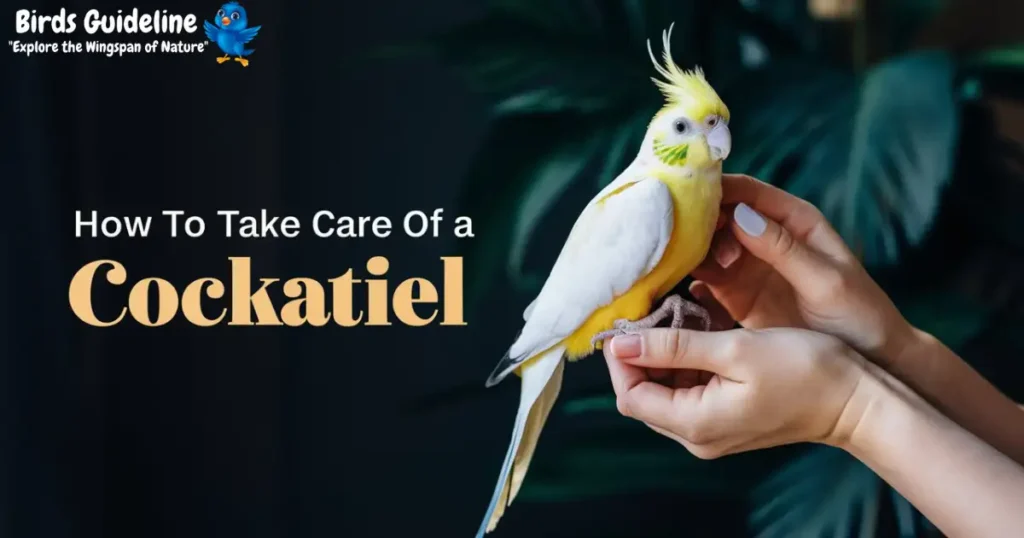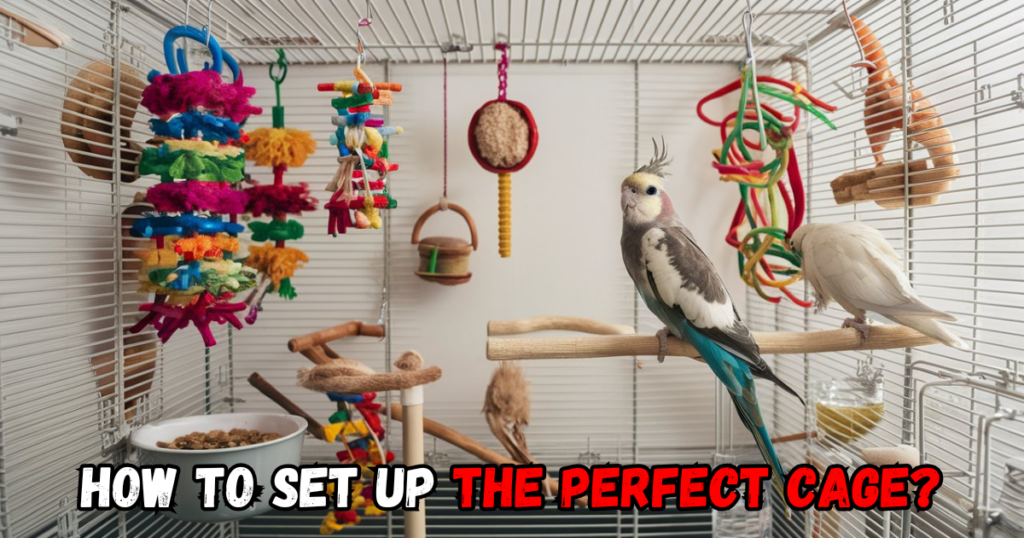Cockatiels are considered low to medium maintenance pets. They require regular interaction and basic care.
Cockatiels have charmed pet enthusiasts worldwide with their sociable nature and captivating whistles. These small parrots stand out as companion birds, beloved for their manageable size and engaging personalities. Originating from Australia, cockatiels adapt well to living indoors with humans, provided they have enough space to roam and exercise.
Their diet is straightforward, consisting mainly of pellet food supplemented with fresh fruits and vegetables. Regular cage cleaning and a consistent supply of fresh water are essential to keep them healthy. While they do enjoy companionship, cockatiels can entertain themselves for short periods, making them suitable for those with moderate lifestyles. Their care requirements, including social interaction, mental stimulation, and physical health maintenance, position them as an excellent choice for first-time bird owners or those seeking a pet with a balance of independence and affection.
Daily Care Needs
Many people wonder about the maintenance level of cockatiels before welcoming one into their home. Cockatiels require daily care that goes beyond simple food and water. Their needs encompass a range of activities designed to keep them healthy, happy, and engaged. Understanding these daily care needs is crucial for any potential or current cockatiel owner.
Feeding Your Feathered Friend
Proper nutrition is the cornerstone of a cockatiel’s health. A balanced diet includes high-quality pellets, fresh vegetables, and occasional fruits. Provide fresh water daily and clean food dishes regularly to prevent bacterial growth.
- Balanced pellet-based diet
- Variety of fresh vegetables
- Occasional fruits as treats
- Clean water and dishes daily
Cleaning The Cage
Keeping the cage clean is essential for your cockatiel’s well-being. Remove waste and uneaten food daily. Deep clean the cage weekly to maintain a sanitary environment, using bird-safe cleaners.
| Task | Frequency |
| Remove waste | Daily |
| Change paper or liner | Daily |
| Clean food and water dishes | Daily |
| Deep clean cage | Weekly |
Interaction And Bonding
Interaction is key to your cockatiel’s emotional health. Spend time daily with your pet, engaging in play and training. This strengthens your bond and keeps your bird mentally stimulated.
- Playtime outside the cage
- Training sessions for mental stimulation
- Cuddles and petting for bonding
Exercise And Play
Cockatiels need space to fly and roam. Make sure they get adequate exercise regularly by allowing out-of-cage time in a safe, bird-proofed area. Offer a variety of toys to keep them entertained.
- Out-of-cage time in a safe area
- Flight exercises for physical health
- Toys for enrichment
Health Checks
Regular health checks help identify issues early. Observe your cockatiel for changes in behavior, appetite, or droppings. Schedule annual vet visits for professional health assessments.
- Observe regularly for unusual signs
- Monitor droppings for changes
- Annual check-ups with an avian vet
Housing Requirements
Cockatiels are popular pets known for their friendly nature and beautiful plumage. Many potential pet owners wonder about their maintenance level, especially regarding their housing requirements. Creating a comfortable, safe environment is crucial for their well-being.
Ideal Cage Size
A spacious cage is essential for cockatiels. They need room to spread their wings and move around. A cage with a minimum size of 20 x 20 x 24 inches is recommended. However, the bigger, the better, especially if you have more than one bird.
Cage Placement
The location of the cage significantly affects your cockatiel’s happiness. Place the cage in a well-lit room but away from direct sunlight. It should be in a spot that’s free from drafts and not isolated from family activities. This keeps your bird engaged and social.
Perches And Toys
Perches of different sizes are important for foot health. Include at least two perches with different textures. Toys are also crucial for mental stimulation. Rotate toys regularly to keep your cockatiel’s environment interesting and engaging.
Cleaning Requirements
Maintaining a clean cage is essential for your cockatiel’s health. Clean the cage weekly, and replace water and food daily. Regularly check for and remove any spoiled food or droppings. A clean environment prevents diseases.
Safety Considerations
Make sure the cage is safe and secure. Avoid cages with toxic materials or sharp edges. The spacing between bars should be small enough to prevent your cockatiel from escaping or getting stuck. Regularly inspect the cage for any damages or hazards.
Health Considerations
When it comes to cockatiels, prospective pet owners often wonder about their maintenance level. Understanding the health considerations of these charming birds is crucial. Proper care can prevent common health issues, promoting a happy and healthy cockatiel. Let’s look at the key health aspects you should be aware of.
Regular Veterinary Visits
Regular check-ups are vital for maintaining your cockatiel’s health. Schedule annual visits to an avian vet for a general health assessment. This helps catch any potential issues early on.
Balanced Diet Requirements
A nutritious diet is the cornerstone of a cockatiel’s health. Include a mix of seeds, pellets, fruits, and vegetables. Make sure clean, fresh water is always available.
- Seeds
- Pellets
- Fresh fruits
- Dark leafy greens
Exercise And Stimulation
19/19
ChatGPT said:
Cockatiels need daily exercise and mental stimulation. Provide a safe, bird-proofed area for your pet to roam. Offer a variety of toys to keep them engaged.
Signs Of Illness To Watch For
Know the signs of illness in cockatiels. Early detection is key. Symptoms to watch for include:
- Change in droppings
- Feather plucking
- Lethargy
- Respiratory issues
Grooming And Hygiene
Keep your cockatiel clean and well-groomed. Regular baths and nail trims are essential. This prevents skin and feather issues, helping your bird stay comfortable and healthy.
Grooming Essentials
Many potential bird owners wonder about the maintenance involved with cockatiels. These charming birds do require some care to keep them healthy and happy. A crucial part of this care is grooming. Regular grooming keeps cockatiels in top condition. Let’s delve into the grooming essentials every cockatiel owner should know.
Nail Trimming
Nail trimming is vital for a cockatiel’s comfort. Long nails can cause difficulty in perching and lead to foot problems. Owners should trim nails carefully to avoid the quick, a blood vessel inside the nail. A nail file or a piece of sandpaper can smooth out rough edges after clipping.
Feather Care
Feathers need regular attention to keep a cockatiel looking its best. This involves gentle brushing and occasional misting with water. Dust baths are also beneficial, as they help remove excess oil and dirt from feathers. A shallow dish filled with fine dust allows birds to bathe themselves naturally.
Beak Maintenance
Just like nails, a cockatiel’s beak grows continuously. Beak maintenance is essential. Provide cuttlebone or a beak conditioning block to help them keep it in shape. Watch for any discoloration or unusual growth patterns, as these can signal health issues.
Time Commitment
Are you considering a feathered friend for your family? Cockatiels are popular pets, known for their charming personalities and whistling abilities. Before bringing one home, it’s essential to understand the time commitment involved. These birds thrive on interaction and require regular care to stay healthy and happy.
Daily Interaction And Playtime
Cockatiels need daily interaction to form a strong bond with their owners. At least 30 minutes to an hour each day should be set aside for playtime and training. This helps prevent boredom and keeps your bird mentally stimulated.
- Socialization: Engage in games and teach new tricks.
- Exercise: Allow out-of-cage time in a safe, bird-proof area.
Feeding And Cleaning Routines
Consistency is key when it comes to feeding and cleaning. Twice daily feedings are recommended, along with a weekly deep clean of the cage.
| Morning | Evening |
| Refresh water and food | Remove uneaten food |
| Quick cage tidy | Spot clean as needed |
Health Checks And Grooming
Regular health checks and grooming sessions are vital for your cockatiel’s wellbeing. Monthly nail trims and wing clipping, if you choose, are part of the routine care.
- Observe daily for any signs of illness.
- Check feathers, beak, and feet regularly.
Cost Factors
Thinking about adding a feathered friend to your family? Cockatiels are charming companions but understanding the cost factors involved in their care is essential. From the initial setup to ongoing expenses, owning a cockatiel is a financial commitment. Let’s dive into the costs so you can plan your budget and create a happy home for your new pet.
Initial Setup
Before your cockatiel chirps its way into your heart, you need to prepare its home. The initial setup includes several must-haves:
- Cage: A spacious cage is non-negotiable. Cockatiels need room to spread their wings and play.
- Perches: Different sizes and textures keep your bird’s feet healthy.
- Food and Water Dishes: Stainless steel or ceramic options are best.
- Bedding: Paper-based bedding is safe and easy to clean.
- Toys: Mental stimulation is crucial, so a variety of toys is a must.
The table below breaks down the potential costs:
| Item | Cost Range |
| Cage | $70 – $200 |
| Perches | $10 – $30 |
| Food/Water Dishes | $5 – $20 |
| Bedding | $10 – $30 |
| Toys | $20 – $100 |
Don’t forget the first vet visit for a health check. This can cost between $50 and $100. Set aside a budget of $200 to $500 for the initial setup. Prices vary based on brand, quality, and where you shop.
Ongoing Expenses
After the initial setup, you’ll have monthly and yearly costs to keep your cockatiel healthy and happy:
- Food: A balanced diet includes pellets, seeds, and fresh produce. Expect to spend $20 to $40 monthly.
- Bedding: Replace it regularly to maintain hygiene. This comes to about $10 to $30 each month.
- Toys: Keeping your bird entertained means rotating toys. Allocate $5 to $20 monthly for new toys.
- Vet Visits: Annual check-ups are vital and can cost $50 to $100.
Here’s a simple breakdown of ongoing expenses:
| Expense | Monthly Cost | Annual Cost |
| Food | $20 – $40 | $240 – $480 |
| Bedding | $10 – $30 | $120 – $360 |
| Toys | $5 – $20 | $60 – $240 |
| Vet Visits | — | $50 – $100 |
Remember, unexpected costs like illness or injury can arise. It’s wise to have a pet emergency fund. Monthly, you might spend $35 to $90, while yearly costs could range from $470 to $1,180, excluding emergencies. Caring for a cockatiel is a joy, but it’s important to be financially prepared for both initial and ongoing expenses.
Frequently Asked Questions
Are Cockatiels Hard To Take Care Of?
Cockatiels require moderate care, making them suitable for many pet owners. They need daily interaction, a balanced diet, and a clean environment. Regular health checks are essential. With proper attention, these birds thrive, offering companionship and entertainment.
How High Maintenance Are Cockatiels?
Cockatiels are relatively low-maintenance pets. They require daily interaction, a clean cage, fresh water, and a balanced diet. Regular vet checkups maintain their health.
Is Owning A Cockatiel Easy?
Owning a cockatiel requires commitment and proper care. They need a balanced diet, social interaction, and a clean environment. Regular veterinary check-ups are essential. With these considerations, cockatiel ownership can be rewarding but is not necessarily easy.
Conclusion
Caring for cockatiels does require commitment, but it’s manageable. These charming birds thrive with regular interaction and proper care. By maintaining a clean habitat, offering a nutritious diet, and providing ample social engagement, cockatiel owners can enjoy a rewarding companionship.
Remember, a happy cockatiel means a happy home. Adopt the routine, and you’ll find the joy in every chirp and feathered frolic.


